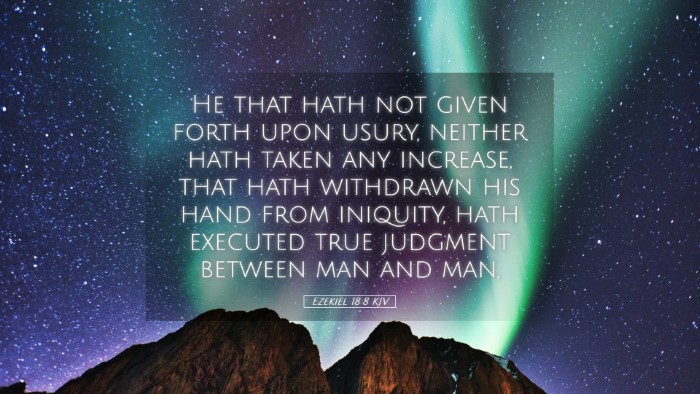Ezekiel 18:8 - Commentary Overview
Ezekiel 18:8 states:
"He does not lend at interest or take any profit; he withholds his hand from wrongdoing and judges fairly between man and man."
This verse is part of a larger discussion in Ezekiel about personal responsibility in matters of justice and righteousness. The prophet Ezekiel articulates the criteria by which individuals are evaluated before God, particularly focusing on moral integrity and fair dealings.
Exegesis and Context
This chapter addresses the Israelite understanding of collective versus individual sin, emphasizing that each person is accountable for their own actions. The broader context of Ezekiel includes warnings of judgment and exhortations to repentance, particularly against the backdrop of Israel's captivity.
Key Themes in Ezekiel 18:8
- Integrity in Financial Dealings: The prohibition against lending at interest raises significant moral considerations regarding exploitation and greed.
- Justice and Equity: The command to judge fairly underscores the importance of impartiality and righteousness in interpersonal relationships.
- Personal Accountability: This verse reinforces the central theme of the chapter that no one can transfer blame for sin; each individual must answer for their own actions.
Commentary Insights
Matthew Henry's Commentary
Henry emphasizes the worship of God in all dealings as a hallmark of a righteous life. He points out that a true believer refrains from usury, highlighting the moral obligation to treat others fairly. He argues that the character of a person is revealed in their financial interactions, indicating that ethical behavior in such matters reflects one's fidelity to God.
Albert Barnes' Notes on the Bible
Barnes elaborates on the significance of not taking advantage of others. He notes the historical context of usury, which was a rampant practice leading to injustice and the oppression of the poor. He calls for an observance of fairness that transcends mere legalistic obedience, proposing instead that moral integrity must be at the heart of all financial transactions.
Adam Clarke's Commentary
Clarke underscores the divine principle of equity and fairness, which forms the foundation of God’s justice. He suggests that God's expectations for behavior towards others are rooted deeply in the character of God Himself, who never engages in injustice. Clarke also posits that the practice of fairness is not only a command but also a reflection of one's relationship with God.
Theological Implications
The implications of Ezekiel 18:8 stretch beyond its immediate context, providing foundational truths for contemporary discussions on ethics, community, and personal accountability. It prompts pastors and theologians to reflect on how these principles apply to modern financial practices, societal justice, and communal life.
- Ethical Living: This verse fosters dialogue on what it means to live ethically in a world that often prioritizes profit over people.
- Social Responsibility: The call to refrain from wrongdoing has implications for social justice and the treatment of the marginalized.
- Spiritual Growth: Understanding personal accountability encourages growth in faith and character, leading individuals closer to God's ideals.
Practical Applications
For those in pastoral care, this verse provides a rich source for preaching on integrity and righteousness. It can be used to challenge congregants to assess their dealings with others, both personally and professionally.
Students and scholars may examine how these Old Testament principles resonate with the teachings of Jesus, particularly in relation to love for neighbor and ethical discipleship.
Conclusion
Ezekiel 18:8 serves as a profound reminder of the call to live justly and righteously. Through the insights provided by the public domain commentaries of Matthew Henry, Albert Barnes, and Adam Clarke, we are encouraged to examine not only how we conduct our lives but also our deeper relationship with God as the ultimate source of justice.


